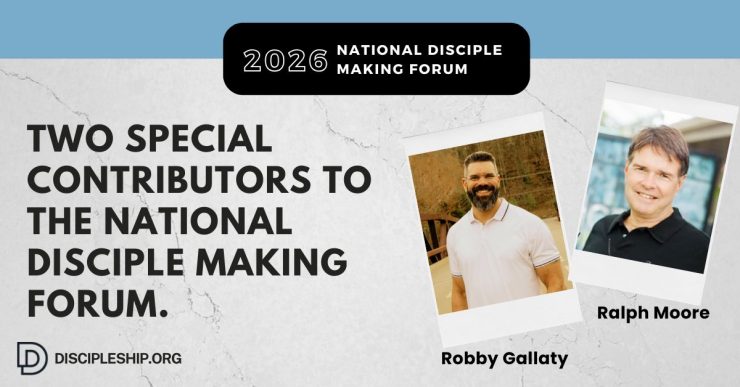Shifting From Gospel Presentation to Gospel Presence

The following content is an excerpt from the eBook Inviting Along. Download your free digital version in your favorite format here.
How do you think of “the Gospel”? How would you summarize it if you had to?
Do you think of it as “Good News”? Is it the most important message to you?
While Jesus certainly intended us to present a “Good News” message to a world full of people who are seeking, I suggest that it is more than merely something we present to others.
Before I give my alternative, let me suggest you download another eBook offered by Discipleship.org called The Discipleship Gospel Primer. It offers rich wisdom and compelling insight about the importance of the Gospel we preach. The Gospel we preach must move us toward being disciples of Jesus who make disciples with Jesus. I recommend it to you as a supplement to what I’m saying here!
The takeaway I want to highlight from The Discipleship Gospel Primer is that the Gospel is more than just an assertion that we are sinners and Jesus died for our sins. That is part of the Gospel, and we must present those facts. But the Gospel is much more than those two facts alone, and it must be presented over time and with our actual presence.
To get other disciple-making content like this—but in person—check out the National Disciple Making Forum and reserve your seat here.
It’s like what a friend of mine named Tommy emailed me about the other day. He said he had heard me speak recently on “what the Gospel is not,” and he typed the following question, which I thought was worth sharing:
What if the Gospel, the Good News of the Kingdom of God, was about Jesus making a way to invite all mankind to become children of God, to live with Him in His kingdom, and to participate in His nature, experiencing His presence in an eternal life lived now and forever with Him? If this were the Gospel we upheld, wouldn’t it change the story of the church today?[1]
The answer to Tommy’s question is that it should change the story. If we upheld this Gospel, it should change how the church is equipped and sent. Does the story of the local church of which you are a part sound something like what he has described?
Instead of settling for a false gospel, we as believers are supposed to gather together to encourage each other and remind each other of our identity in Christ which the cross secures for us. Then, we should challenge each other to engage every day with those who have yet to believe in our Spirit-assured purpose in Christ—to make disciples who make disciples. We share life together in the context of ongoing, authentic relationships, which is abundant with moments in which we need forgiveness, as well as moments in which we enjoy laughter. This is life now and forever in relationship with God. We are together like family, living everyday Gospel presence that validates the Gospel we present.
Shouldn’t that be the story of the church? Let me expound a bit more.
This comes from the free eBook Inviting Along, which you can download here.
First, the Gospel is not just a presentation we make; it is a presentation that has first been made to us.
Like Paul says, “All they have eyes for is the fashionable god of darkness. They think he can give them what they want, and that they won’t have to bother believing a Truth they can’t see. They’re stone-blind to the dayspring brightness of the Message that shines with Christ, who gives us the best picture of God we’ll ever get” (2 Cor. 4:4, The Message). God came near right in front of us while we were still sinners. He did it before we ever said “sorry” and before we ever asked for help. He showed the Good News and He spoke it. Jesus was the best picture of God we’ll ever get. So the way that Jesus presented the Gospel message is how we should present it, too.
Second, the Gospel was not just made known to us through a presentation, but also through an actual presence.
As John writes, “The Word became flesh and blood, and moved into the neighborhood. We saw the glory with our own eyes, the one-of-a-kind glory, like Father, like Son, generous inside and out, true from start to finish. John pointed him out and called, ‘This is the One! The One I told you was coming after me but in fact was ahead of me. He has always been ahead of me, has always had the first word.’ We all live off his generous bounty, gift after gift after gift. We got the basics from Moses, and then this exuberant giving and receiving. This endless knowing and understanding—all this came through Jesus, the Messiah. No one has ever seen God, not so much as a glimpse. This one-of-a-kind God-Expression, who exists at the very heart of the Father, has made him plain as day” (John 1:14-18, The Message).
God didn’t make a presentation in spoken Word only; he came as the living Word. He embodied truth in the skin of grace that lived, died, and came to life again in order to declare His love to us. Through this, He invited us along with Him into His eternal life and forever goodness. In fact, Jesus “revealed” or “clarified” God’s Message as well as God Himself—the Message-Initiator—as “plain as day” (John 1:18). He came in physical presence in order to do so.
Next, this Gospel we have believed also compels us to share it with a world that longs for more than the bad news they see, hear, and feel.
This “presence” of God coming near to a people who had not acted very lovable, this Message that wrecks us and restores us day after day as we move from death to life, this is what makes us share the Gospel.
As Paul says, “For Christ’s love compels us, since we have reached this conclusion: If One died for all, then all died. And He died for all so that those who live should no longer live for themselves, but for the One who died for them and was raised. From now on, then, we do not know anyone in a purely human way. Even if we have known Christ in a purely human way, yet now we no longer know [Him in this way]. Therefore, if anyone is in Christ, [he is] a new creation; old things have passed away, and look, new things have come. Everything is from God, who reconciled us to Himself through Christ and gave us the ministry of reconciliation: That is, in Christ, God was reconciling the world to Himself, not counting their trespasses against them, and He has committed the message of reconciliation to us. Therefore, we are ambassadors for Christ, certain that God is appealing through us. We plead on Christ’s behalf, ‘Be reconciled to God.’ He made the One who did not know sin to be sin for us, so that we might become the righteousness of God in Him” (2 Cor. 5:14-21, HCSB).
Our embodiment of this Gospel demonstrated both by our lives reconciled to live in the presence of God as well as by our lives reconciled to live in gracious, life-giving, family-like presence with one another—no matter our race or color or status or background—this is the ministry of all who have believed the Gospel. We are ambassadors for Christ and with Christ.
Finally, if we don’t go near those who have yet to believe the Gospel, how can they believe?
Another way to say this is if we don’t invite them along with us to learn and discover and embody and live and give away this Gospel, how will they ever become disciples?
Paul writes about this when he says, “Say the welcoming word to God—‘Jesus is my Master’—embracing, body and soul, God’s work of doing in us what he did in raising Jesus from the dead. That’s it. You’re not ‘doing’ anything; you’re simply calling out to God, trusting him to do it for you. That’s salvation. With your whole being you embrace God setting things right, and then you say it, right out loud: ‘God has set everything right between him and me!’ Scripture reassures us, ‘No one who trusts God like this—heart and soul—will ever regret it.’ It’s exactly the same no matter what a person’s religious background may be: the same God for all of us, acting the same incredibly generous way to everyone who calls out for help. ‘Everyone who calls, “Help, God!” gets help.’ But how can people call for help if they don’t know who to trust? And how can they know who to trust if they haven’t heard of the One who can be trusted? And how can they hear if nobody tells them? And how is anyone going to tell them, unless someone is sent to do it? That’s why Scripture exclaims, ‘A sight to take your breath away! Grand processions of people telling all the good things of God!’” (Rom. 10:9-15, The Message).
Let me point out a few elements of this passage about discipleship.
Presence. This is represented by the passage, “How beautiful are the feet of those who bring good news” (Rom. 10:15, CSB). People will see why the Gospel would matter to them when they see and hear—up close—why the Gospel still matters to us. Just like God who came near to us, may we also go near, inviting others along into His family, too.
Relational disciple making. Teaching is one of the facets of making disciples according to the “Great Commission” (Matt. 28:18-20). But what if “teaching” in the Great Commission is more about learning together than lecturing to others? Relational disciple making allows us to give love to one another like it has been given to us. In the process, we learn grace together as we experience Gospel life in the context of the everyday (rather than only in the context of a classroom). Then, we have the best chance to move from being lost into a life of faith as each of us realizes more and more the reality of our Gospel-identity, Christ-security, and abundant-life purpose—all of which has been freely given to us.
May we make more than a “presentation” by actually showing the same love that has been shown to us with our presence. That would be a shift from informational discipleship to relational discipleship in the way of Jesus.
Here’s an example of what I mean by way of analogy. Amy was an All-American basketball player at Belmont University, who now has the privilege of discipling female student-athletes who are connected to the colleges in downtown Nashville. She and her colleague, Betty—the woman who actually founded the girls basketball program at Belmont, the very woman who discipled Amy—now “invite along” the current basketball players together into discipling relationships. They don’t introduce themselves to the new players by saying, “My name is Amy, and this is Betty; if you died tonight, would you go to heaven or hell? Well, to remedy that, why don’t you enter into a disciple-making relationship with us so that you can be sure of the answer?” If they did ask that, most new players would shuffle backwards and avoid them as much as possible.
I think people sometimes struggle because they make disciple making too complicated. They forget that it is first and foremost a friendship in which we care for others. Jesus told His followers, “You are my friends” (John 15:15, The Message). Sometimes I worry that those who have immersed themselves in nothing but church have forgotten how to simply be friends with someone outside the church. Presence is friendship, and it happens during meals and walks and tragedies and celebrations and hobbies and heartaches and losses and victories and fears and accomplishments.
Amy and Betty don’t introduce themselves like I mentioned above; they simply become friends with new players, not with the agenda of church growth or proselytization. Rather, their agenda is to offer abundant life as it was given to them—in relationship.
Amy and Betty have befriended and “invited along” numerous players to eat and serve and Sabbath and learn together. This happens over time and in relationship. It comes through ongoing Gospel conversation in the flow of normal encounters, sometimes in short snippets, sometimes in long talks together. Relational presence offers the context for Amy and Betty to make disciples with Jesus while their lives and the lives of the basketball players are transformed.
Their disciple-making efforts are not information driven; they are relationship driven.
As a result, most of the ones they disciple have begun to multiply and also make disciples in the same way they were made disciples of Jesus—as friends.
Here’s the secret, though, to disciple making with presence: it is all about the welcome. Here’s what I mean by “welcome”: You and I must go near, take initiative, be willing to present snippets of the Gospel along the way, and allow for margin in our lives so that we can be relationally present. But we can’t force someone into this. We can’t say to someone, “I am going to make you into a disciple by having presence with you, and you will reciprocate that presence with me.” It can’t be forced in that way. You and I must take initiative to go near and be willing to engage in friendships defined and directed by actual, everyday presence. When we do, people will begin to notice that we are open and generous with our lives and that we are willing to make margin for them to come alongside us in ongoing friendship. Then, motivated by various reasons—desire for a caring friend, the need to talk to someone who could help them, a longing to simply belong—some of those people will welcome us into their lives.
Some of those along the way will open up to us because of the way we have taken initiative to open up to them. They will welcome our invitation to come along in a disciple-making relationship—not because they’re aware of a need to be discipled but simply because they intrinsically know they need our presence.
I fear that evangelism training during the twentieth century neither equipped us for presence, nor sensitized us to how some people will welcome presence but others aren’t ready to welcome it. Jesus told His disciples in Matthew 10 (the first time He sent them) to look for people who would welcome them into their home and into their lives. We too often just look for the next opportunity to barge into other people’s lives and offer them a polished presentation.
This is not how disciples of Jesus make disciples with Him.
Let’s take initiative to offer presence and see who might welcome us into their life.
As we do, let’s remember that it may take three to five years with only one to three people who welcome our presence. These are the people with whom we enter into an ongoing, disciple-making relationship that has more Kingdom potential—exponentially more potential—than 10, 20, or even 30 presentations made in forced, unwelcomed conversations with strangers or acquaintances.
Note: I am not saying presentation of the Gospel is not necessary for conversion. I am saying presentation is, in fact, necessary but most often in the context of this “presence” type of friendship. Sharing the Gospel on a whim with a stranger is not the norm in the New Testament; it is the exception. I write this so that we don’t feel pressure to make it the norm in our disciple-making efforts today.
Written by Jason C. Dukes
Jason and Jen have been married since August 1998. They met at Union University in Jackson, Tennessee. Since August 2015, they have lived with their seven kids and yellow lab in the Nashville Tennessee area, where Jason coaches and equips disciples making disciples, churches starting churches, and churches renewing their intended purpose. Jason has helped start Westpoint Church, House Blend Cafe, the Reproducing Churches Network, and the Church of West Orange. He has also served as a student pastor, college pastor, lead pastor, and multiplication minister. Learn more about his writings at www.LiveSent.com.
Photo by Dylan Gillis on Unsplash
NOTES:
[1] Shared here with permission.
If you have enjoyed reading this, please consider joining our email list!












